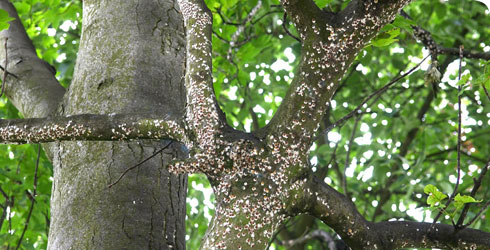Conservation
The horse-chestnut scale is considered an urban pest where its white ovisacs cause significant cosmetic deterioration to the appearance of trees.
However, Pulvinaria regalis is not generally regarded as a damaging pest. It usually feeds on trees that can easily withstand the sap loss.
There have, however, been records of this species causing the death of a host plant, where young and stressed plants seem most at risk. Plant stress is often greatest in urban environments.
Tiny parasitoid wasps can limit populations of insect pests. However, the horse-chestnut scale is not effectively controlled by parasitoid wasps - ironically the wasp pupae overwinter on fallen leaves, which are removed and destroyed in towns, thereby killing perhaps the most effective control agent.
The horse-chestnut scale has become far too widespread and abundant for effective managed control. However, the crawlers are vulnerable to insecticides and so individual plants can be treated by several insecticide applications in June and July.
